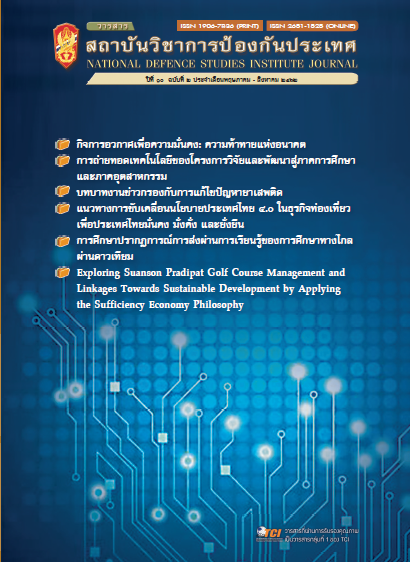A Causal Relationship Model of Factors Influencing Effectiveness the Royal Thai Army Branch Service Schools
Main Article Content
Abstract
The purposes of this study were 1) to study factors that influence the effectiveness of the
Royal Thai Army Branch Service Schools 2) to examine suitability and accordance of a causal
relationship model of factors that influence the effectiveness of the Royal Thai Army Branch
Service Schools and empirical data and 3) to present a casual relationship model of factors
that influence the effectiveness of the Royal Thai Army Branch Service Schools. A sample was
randomly selected from the Royal Thai Army Branch Service School teachers. The tool is the
questionnaires developed by the researcher. The statistics used in data analysis were descriptive
statistics, correlation coefficient analysis, confirmatory factor analysis and structural equation
model analysis.
The finding indicated that 1) factors that influence the effectiveness of the Royal Thai Army
Branch Service Schools were transformational leadership, emotional quotient, competencies of
school administrators and learning organization 2) a causal relationship model of factors that
influence the effectiveness of the Royal Thai Army Branch Service Schools has consisted with
the empirical data 3) a causal relationship model of factors that influence the effectiveness
of the Royal Thai Army Branch Service Schools that (1) the direct effect has 3 factors: learning
organization; competencies of school administrators and transformational leadership with the influence
coefficients at 0.94, 0.34 and -0.14 respectively, (2) the indirect effect has 3 factors: emotional
quotient; transformational leadership and competencies of school administrators with the
influence coefficients at 0.77, 0.71 and 0.01 respectively and (3) the total effect has 4 factors: learning organization; emotional quotient; transformational leadership and competencies of school
administrators with the influence coefficients at 0.96, 0.77, 0.57 and 0.34 respectively.
Article Details
References
กรมสุขภาพจิต. (๒๕๔๓). อีคิว: ความฉลาดทางอารมณ์. นนทบุรี: สำนักพัฒนาสุขภาพจิต.
กริช แรงสูงเนิน. (๒๕๕๔). การวิเคราะห์ปัจจัย SPSS และ AMOS เพื่อการวิจัย. กรุงเทพฯ: ซีเอ็ดยูเคชั่น.
กองการศึกษา กรมยุทธศึกษาทหารบก. (๒๕๔๙). งบประมาณงบงานศึกษาตามหลักสูตร. กรุงเทพฯ: กองการศึกษา กรมยุทธศึกษา
ทหารบก.
จงกล วิเศษขลา. (๒๕๕๔). ความสัมพันธ์ระหว่างสมรรถนะการบริหารของผู้บริหารโรงเรียนกับประสิทธิผลของโรงเรียน
สังกัดสำนักงานเขตพื้นที่การศึกษาในจังหวัดนครพนม. วารสารมหาวิทยาลัยนครพนม, ๑(๒); ๖๓-๖๙.
จิตรา ทรัพย์โฉม. (๒๕๕๖). ความสัมพันธ์ระหว่างภาวะผ้นูำแบบเปลี่ยนสภาพของผู้บริหารกับประสิทธิผลการบริหารโรงเรียน
สังกัดสำนักงานเขตพื้นที่การศึกษาประถมศึกษาสกลนครเขต ๒ (วิทยานิพนธ์ครุศาสตรมหาบัณฑิต สาขาวิชาการบริหารการ
ศึกษา). มหาวิทยาลัยราชภัฏสกลนคร.
ดิเรก พรมบาง. (๒๕๔๓). ปัญหาการศึกษาในกองทัพบก. เสนาธิปัตย์ ๔๙(๒); ๓๒-๓๖.
ดิลกฤทธิ์ อภิวัฒนสิงหะ. (๒๕๕๐). ศึกษาความฉลาดทางอารมณ์กับความสำเร็จในการทำงานของผู้บริหารสถานศึกษา
สำนักงานเขตพื้นที่การศึกษากำแพงเพชร เขต ๑ (วิทยานิพนธ์ครุศาสตรมหาบัณฑิต สาขาวิชาการบริหารการศึกษา).
มหาวิทยาลัยราชภัฏกำแพงเพชร.
ธวัชชัย ตั้งอุทัยเรือง. (๒๕๕๗). โมเดลความสัมพันธ์เชิงสาเหตุของประสิทธิผลโรงเรียนประถมศึกษา ขนาดเล็กสังกัด
สำนักงานคณะกรรมการการศึกษาขั้นพื้นฐานในภาคกลางของประเทศไทย (วิทยานิพนธ์ปรัชญาดุษฎีบัณฑิต สาขาวิชาการบริหาร
การศึกษา). มหาวิทยาลัยคริสเตียน.
เปรมปรีดิ์ หมู่วิเศษ. (๒๕๔๙). รูปแบบความสัมพันธ์เชิงสาเหตุระหว่างองค์ประกอบความฉลาดทางอารมณ์ของผู้บริหาร
กับประสิทธิผลโรงเรียนอาชีวศึกษาเอกชน (วิทยานิพนธ์ศึกษาศาสตรดุษฎีบัณฑิต สาขาวิชาการบริหารการศึกษา).
มหาวิทยาลัยสงขลานครินทร์.
พรชนก เกตุกัณฑร. (๒๕๕๑). การศึกษาความสัมพันธ์ระหว่างภาวะผู้นำและสมรรถนะหลักของเทศบาลนครนนทบุรี
(วิทยานิพนธ์ศิลปศาสตรมหาบัณฑิต สาขาวิชารัฐประศาสนศาสตร์). มหาวิทยาลัยมหิดล.
พัฒนะ สีหานู. (๒๕๕๓). รูปแบบความสัมพันธ์เชิงสาเหตุของปัจจัยที่มีอิทธิพลต่อประสิทธิผลของโรงเรียนขนาดเล็ก
สังกัดสำนักงานเขตพื้นที่การศึกษาในภาคตะวันออกเฉียงเหนือ (วิทยานิพนธ์ปรัชญาดุษฎีบัณฑิต สาขาวิชาการบริหารการศึกษา).
มหาวิทยาลัยราชภัฏเลย.
วิโรจน์ สารัตนะ. (๒๕๔๔). โรงเรียนองค์การแห่งการเรียนรู้. กรุงเทพฯ: อักษราพิพัฒน์.
วีรวุธ มาฆะศิรานนท์. (๒๕๔๐). วินัย ๕ ประการ พื้นฐานองค์การแห่งการเรียนรู้ (พิมพ์ครั้งที่ ๒). กรุงเทพฯ: เอ๊กซเปอร์เนท.
Senge, P.M. (1990). The Fifth Discipline: The Art and Practice of the Learning Organization. New York: McGraw-
Hill.

